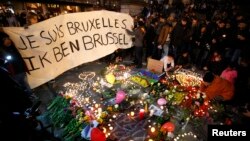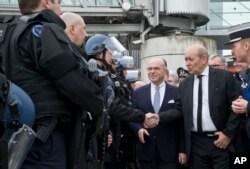U.S. Secretary of State John Kerry will travel to Brussels on Friday "to formally express the condolences of the United States for the loss of life" in Tuesday's deadly attacks in the Belgian capital.
"He will reiterate the strong support of the United States for Belgian efforts to both investigate these attacks and continue contributing to international efforts to counter violent extremism," State Department spokesperson John Kirby said Wednesday.
Earlier, Vice President Joe Biden said Wednesday that the United States is prepared to give Belgian authorities information, capability, technology and anything else to help the county fight and prevent acts of terrorism. Biden made his comments during a visit to Belgium's embassy in Washington to sign a condolence book.
In Brussels, French Prime Minister Manuel Valls called on the European parliament to act on authorizing a passenger name record (PNR) for Europe. Speaking after a meeting Wednesday with EU Commission President Jean-Claude Juncker, Valls said the West is dealing with a terrorist organization that has been able to establish terrorist cells at the heart of Western societies.
Meanwhile, France's ministers of interior, defense and transport visited Paris' main airport to meet with security forces there. Interior Minister Bernard Cazeneuve said that an additional 1,600 security officers had been deployed across the country following the Brussels attacks.
France remains in a state of emergency after terrorist attacks killed 130 people and wounded more than 350 last November in Paris.
At the Vatican, Pope Francis led thousands of people in silent prayer for the victims of the attacks at Brussels' airport and in its subway. The pope also appealed to “all persons of good will to unite in unanimous condemnation” of the attacks causing death, horror and sorrow.
Belgian vulnerability
The explosions in Belgium's capital, Brussels, occurred within a few kilometers of the area that is home to the headquarters of NATO and the European Union, the European continent’s core institutions, heightening concerns about security in the Belgium capitol.
Official estimates last year said nearly 500 young Muslim residents of Belgium have traveled to Syria or Iraq to join extremist groups, making it the European country with the highest number of foreign fighters per capita.
Belgium’s small size has also meant that it has fewer anti-terrorism resources compared to larger nations like the United States, Britain or France.
In addition to a lack of resources, observers say institutional fragmentation and poor intelligence sharing have hampered Belgium's ability to counter terrorism. “Brussels itself has 19 municipalities and six different police forces, which presents an obvious operational challenge,” Benoit Gomis, a specialist on terrorism and European defense at Chatham House in London, told VOA.
Tuesday’s attacks could spark a new, unified push to help Belgium boost its security infrastructure.
“Above all, it will be critical for the EU to substantively improve intelligence sharing among member states,” Florian Otto told VOA. Otto notes measures were already agreed after last year’s Paris attacks, which were largely organized in Belgium.
Analysts say Tuesday’s attacks could see the idea of a joint EU intelligence unit put back on the agenda. Other areas include counter-radicalization efforts and combined operations to combat arms trafficking.
Such a coordinated approach could trigger opposition in some European governments that are already wary of EU overreach, one of the issues driving the desire among some in Britain to break away from the grouping.
Governments across Europe have announced measures to boost security at borders and transit points.
In a televised statement from NATO headquarters in Brussels, Secretary General Jens Stoltenberg said the bloc stands with its ally Belgium "on this dark day.”
He said this “cowardly” act with a “heavy” and “tragic” human toll is an attack on democratic values and open societies, adding that “terrorism will not defeat democracy and take away our freedoms.”
European Union Council President Donald Tusk said he was appalled by the attacks and offered Europe's support.
Tusk said that “these attacks mark another low by the terrorists in the service of hatred and violence,” adding that the EU “will fulfill its role to help Brussels, Belgium and Europe as a whole counter the terror threat” they are facing.
“Through these attacks in Brussels, it was all of Europe that was hit,” wrote French President Francois Hollande (@fhollande) on Twitter.
Following an emergency Cabinet meeting in London, British Prime Minister David Cameron condemned the blasts and said Europe should stand together. "We will never let these terrorists win," Cameron said.
German Chancellor Angela Merkel's chief of staff, Peter Altmaier, called for solidarity with Belgium, writing on Twitter that “terrorists will never win.” He added that “our European values [are] much stronger than hate, violence, terror!”
Russian Foreign Ministry spokeswoman Maria Zakharova said the West's politics of “double standards” have led to terrorist attacks and that frozen diplomatic relations between NATO and Russia have slowed the fight against terrorism. But the Kremlin offered its condolences and expressed solidarity with Belgium.
(VOA's Cindy Saine contributed to this report from Mosow)
Photo Blog: Belgium Mourns Terror Attack Victims







